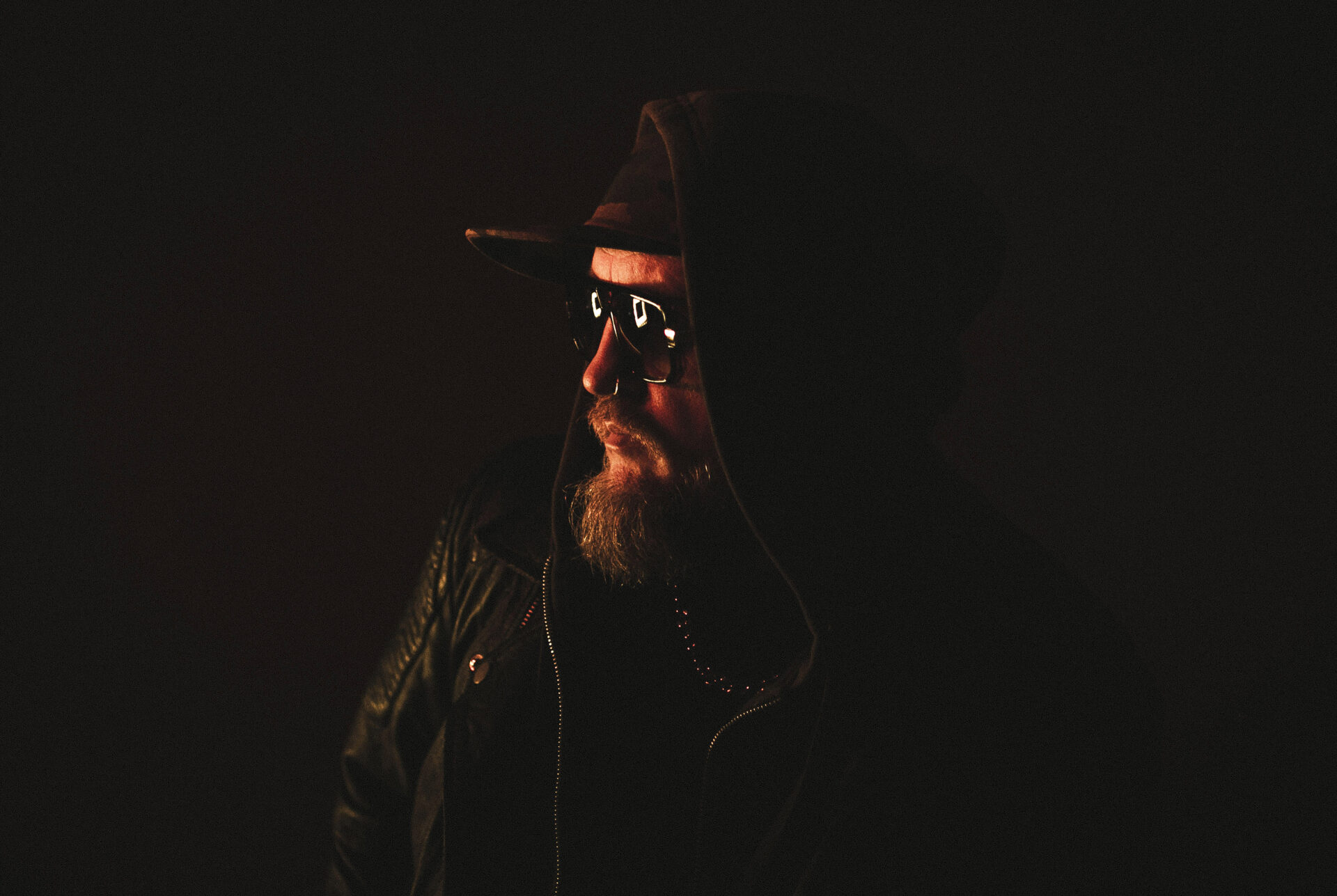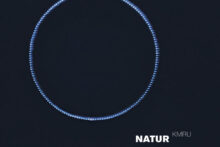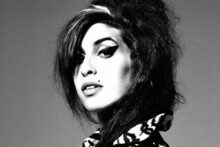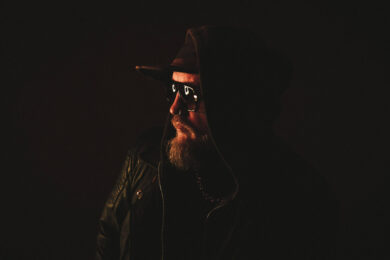Since releasing tQ’s Album of the Year, Fire, in 2021, Kevin Richard Martin hasn’t stopped moving – partly out of a need to create, partly due to his survival instinct after COVID lockdowns meant shows couldn’t be played. This prolific run has led to diverse and gutsy material, largely self-released under his given name.
There’s Disconnect, a caustic ambient collaboration with KMRU. There’s Black, a full-length tribute to Amy Winehouse, where ‘Back To Black’ becomes a shadow – haunting fragile instrumentals. He made Absent Riddim, a take on Jamaican dancehall riddim records where sixteen vocalists from across the genre spectrum tackle the same beat. And on Machine, released earlier this month, he returns to The Bug moniker with all the grit and energy you’d expect.
As he prepares for live shows, including a debut for Black at Semibreve festival, he takes us through the art that came out of this hectic new chapter.
What inspires you to create at the moment?
Kevin Richard Martin: I’ve always had a compulsion to make music. It was my only way out. I was kicked out of home at 16. I had no qualifications from school. I was surrounded by chaos. My family life was hell. Punk music offered a view of people who were in the same messed-up situations. Then post punk gave a map of how to do it myself. That whole DIY ethic has stayed with me, as have a lot of the politics of punk music. There’s never a day that goes by that I don’t make music. It’s literally a craving, entering a parallel universe because the real one’s fucked.
For some people who love punk, by the time they reach 50 there’s comfort in returning to old sounds. You’re always looking for the new.
The idea of looking back in general is the antithesis of how I think. A lot of the music that means most to me instils the shock of the new, like having an electric shock therapy sonically.
As you get older, there’s a temptation to go backwards and look for comfort. I prefer discomfort. Society and socials are all about being liked. With Machine, I was happy to be unliked as I was when I started my music career, where I literally wanted to empty rooms.
What are you looking forward to with current live shows?
The Bug shows have became a revelation to me in the last five to 10 years, because it’s finally the audience of my dreams. It’s a mixed audience – male, female, Black, white, gender and genre-non-specific. Suddenly metalheads have been showing up, judging by the amount of Sun O))) and Godflesh t-shirts. That never happened before. Seeing people either dance their asses off, suddenly igniting massive mosh pits, or getting lost in the sound the way I love to be is joyful.
I’m doing Disconnect next week for the first time with KMRU. With that and Black, I’m thinking about how to morph them. It’ll be similar to how I’ve worked with Frequencies For Leaving Earth. I’ll have multi-tracks. I’ll add and subtract elements. There’ll be dub mixes of the material. It will depend on how I react to the environment in any given situation. With the Kevin Richard Martin stuff, my agent’s quite relieved because it’s not all about volume. I don’t insist on how huge a rig has to be. It can be intimate, in more intimate venues.
Machine was self-released as a series of EPs before coming together as a collection. Why did that process feel right?
A need for excitement and energy, particularly coming out of the COVID era. I wanted to nurture energy for shows that were finally coming up again. In particular, the Pressure parties that I throw in Berlin. The EPs were really timed. A new batch was to coincide with a show. In a way, it was stressful as fuck. I terrorised my mastering engineer and my family because I was intent on hitting those shows and Bandcamp Fridays. There’s a huge adrenaline rush when you’re able to play the material that night and release it that day. The beauty of Bandcamp is that you can cut out the middleman, the industry do’s and don’ts. You make your own deadline, and that was massively exciting.
On not working with a vocalist, lyrics can be an anchor for describing the kinds of dystopia that you want to present. The dystopia on Machine is felt through texture. What feeling do you want people to have when they listen?
A ghost in the machinery, a ghost within the mechanism of tyranny. It’s trying to vocalise that and interpret the difficult situations life throws at you governmentally, culturally. It’s a form of catharsis. Despite the fact I’m absolutely smitten by post-apocalyptic science fiction, I’ve never seen what I do as dark. I’ve always seen it as a reaction to darkness, a light at the end of the tunnel. That’s been the challenge with the tonality and texture of the material. It means that there’s artistry. It’s not just thuggishness. Even in the deepest recesses of the material on this series of EPs, there’s melancholy melodies floating around.
Turning to Black, What was it that made you connect with Amy Winehouse’s story?
It was literally having nothing to do on this long-haul flight, and always being addicted to watching any type of music documentary, even if I can’t stand the artist. I was sucked into the [2014 Asif Kapadia] documentary. It was an incredible portrait of tragedy, and quite shocking how all family support networks seemed to evaporate for her when money was involved.
It’s so sad that her demise came the way it did, and that it was played out in public. Everyone can see what’s happening but no one puts on the brakes. Tears were rolling down my cheek on the flight which I didn’t expect. It brought home memories for me of broken families, broken homes.
The song ‘Back To Black’ is central to the record, and you can hear the inspiration.
I remember saying to my wife ‘I’m going to do a whole album based on samples of ‘Back to Black’. She looked at me like, ‘Has he lost his mind?’ In our family we go down YouTube rabbit holes all the time, My daughter is seven. She’s addicted to music. I try to find pop songs for her because I can’t play hip hop during the day when my kids are around. The amount of bad language crucifies me from my wife. I found ‘Back To Black’ and loved it. It became an obsession.
I also loved the idea that it’s the last thing people would expect me to do. It would challenge people’s preconceptions about what good taste is. Some people would say, ‘The fuck has The Bug got to do with Amy Winehouse?’ I don’t really know myself other than on a purely emotional level, that track resonated with me.
I’m never going to be able to clear the samples. I don’t have the money, inclination or links to do it, so I completely erased the samples, and reconstructed the material that was left. In a way. It’s very much still a reaction to the song. It’s a totally alien interpretation.
Moving to Disconnect with KMRU, how did you end up connecting?
I had been going through some difficult times trying to understand how I’m going to feed four mouths and pay the rent when all my shows were canceled. I started becoming even more immersed in solo work as Kevin Richard Martin. It seemed to be a parallel path that Joseph [Kamaru, aka KMRU] and I were treading sonically, but from very different backgrounds. I knew he lived in Berlin. He seemed up for it because he’d just got into my material, too. I said, “What I’d like to do is have you record vocals.” It threw him a bit. I can remember the messages going back and forth.
I was so smitten by the tonality of his voice in the [Under The Bridge] documentary I’d seen. It’s like poetry how he puts his words across. Luckily he agreed to it. My idea I put to him was, “You’re an African living in Berlin studying an ultraacademic music course. Do you feel connected or disconnected? Do you feel welcomed or alienated?” He loved that idea and had actually been studying similar concepts at college. We laugh about it now, but it wasn’t hard work. It was the joy of creation and working with someone who’s on the similar path and understanding what we were both trying to achieve.
Then Absent Riddim is a totally different record where you’re pulling from this lineage of Jamaican dancehall riddims.
I had this madcap idea. How about doing a ‘versions’ album where it’s not all Dancehall MCs? I wanted to have as wide a catchment area of collaborators as I could. I loved it because of my addiction to buying reggae 7-inches when I lived in North West London. I would buy ten versions of the same riddim by different vocalists. I felt it stood up as a different interpretation. The irony is, I’ve seen people in the sewer of YouTube comments dissing the shit out of Absent Riddim, because “it’s just the same riddim”. They don’t seem to care that there’s a different vocalist… It’s nuanced. It evolves and mutates.
I can imagine there were surprises. You can’t predict how Dis Fig will take it compared to Nazamba and Dälek.
When you have Jonnine from HTRK, who was surprised I even knocked on her door, then you have Ethan Lee McCarthy from Primitive Man, the contrast is so extreme. I love that. The sad irony is three people [Jaimie Branch, Nazamba, and Mark Stewart] passed away during the making of the record. It was a punishing album to make by the end, because I lost friends whilst making it.
On Red Light and White Light you explored a complicated history with the saxophone. What led to that?
An inferiority complex. Once you hear John Coltrane, you can never say you’re a saxophonist in comparison. When I first picked up a sax and I had to do lessons, I did them for a very short time because I couldn’t stand learning standards. That evolved into playing saxophone through two Marshall cabs and a wall of pedals that Kevin Shields would endorse, then trying to find a voice in the tonality. I still don’t feel that I have the chops or the artistry that I would personally want. It’s a love-hate relationship.
Most saxophone players, in my opinion, play too many notes. It’s like hearing guitar solos endlessly. I had the idea of reducing sax to air, so it evolves subconsciously and you feel like it’s not moving, taking pre-existing recordings, but also using synthetic sax and putting them in the echo chamber, seeing how I could liquefy a metallic instrument.
What ties all of your self-released material together?
It was a monastic retreat for me. It’s totally selfish, I had no idea they would mean anything to anyone. I had to do them because I had no other choice, as much as anything else to stay sane during COVID, but also just to keep developing my voice. My obsession throughout my musical life is how can I make anything sound like me. The artists I love have an instant voice – that’s a Pharoah Sanders saxophone solo, Billie Holiday’s voice, a Joy Division track, a Bomb Squad production, a Wiley Eskimo Devil mix. It doesn’t matter who it is. They have a trademark sound. That’s the big battle.
Kevin Richard Martin presents the world premiere of his live show Black at this month’s Semibreve festival, which takes place from 24 to 27 October in Braga, Portugal. For the full lineup and further information, click here.





